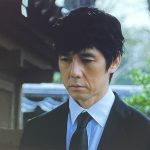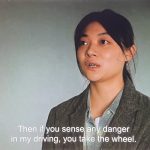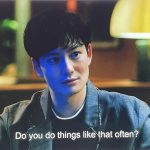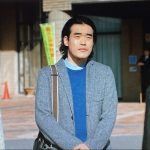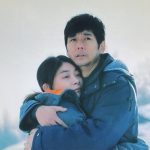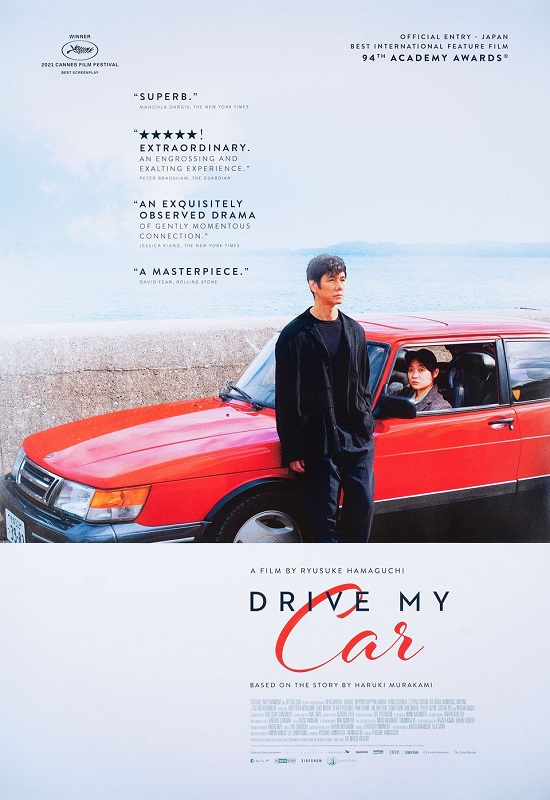

Drive My Car – 2021
I find myself thinking of the quote by Mark Twain. “My books are water, those of the great geniuses is wine. Everybody Drinks water.” Drive My Car is the wine. It was a deep and complex movie that explored themes of grief, loss, and regret. It had some really beautiful cinematography and a very somber and dramatic score. The problem is… I’m not terribly fond of wine. Some film critics call this movie a masterpiece by Director Ryusuke Hamaguchi and it has a high score on film aggregation websites like Rotten Tomatoes and Metacritic. But my goodness, it was so slow, making it feel like they were just trying way too hard to be deep.
The movie was three hours long and it felt like six. The pacing of the movie was glacial! I’m not saying it needed to be as fast paced as an action film, but there were too many lengthy establishing shots, scenes that could have been shortened, dialogue that could have been cut. I think a film with this little actual story would have been just fine with a two hour run-time, but maybe I’m wrong about that.
So here’s the plot, in a nutshell. Yusuke Kafuku is a theatre director, played by Hidetoshi Nishijima. His wife Oto, played by Reika Kirishima. Kafuku knows his wife cheats on him regularly, but he still loves her, and knows that she loves him. Unfortunately, one day, she dies of a brain hemorrhage. Two years later, he agrees to direct a multilingual production of Chekov’s Uncle Vanya in Hiroshima, and a condition of the theatre company is that the director must have a hired driver. He is not allowed to drive his own car. We then meet Misaki, a young girl who is a professional driver, played by Toko Miura.
As fate would have it, one of his wife’s lovers, Koji Takatsuki, played by Masaki Okada, auditions for a role. Yusuke casts him in the lead, and the two men get to know each other. But Koji is forced to leave the production when he is arrested for murder. Yusuke must take on the demanding role himself, but in order to do so, he must first get past his grief over Oto’s death and the regret he feels for never having confronted her about her infidelities. We also learn that Misaki had issues with an abusive mother. Together, and seemingly in a single two-day period, Yusuki and Misaki face the demons of their past and overcome them. That’s the bare bones of the narrative.
So, on the surface, it is a simplistic plot. But the overall feeling of depression that permeates the story is strong, and it is interesting to see how Yusuke deals with his emotions, or I should say, how he doesn’t deal with them. He seems to ignore his own feelings. He had every right to be outraged, or at the very least hurt, by his wife’s habitual cheating. But in order to keep his perceived balance in their marital relationship, he allows her behavior without comment or complaint. And when she died, he had every right to feel cheated by fate. Yet accepts her death with a kind of sad resignation. The only other indication he is upset is that he cannot continue his performance as the lead in Chekhov’s Uncle Vanya.
And it isn’t until the cathartic scene in the end, which he shares with Misaki, that he puts his anger with his wife and his anger with her untimely death into words. It was a powerful scene. I often think of it as a common trait of Japanese people and culture to strictly keep one’s emotions to one’s self. So it is always pretty intense when someone who is a part of that culture breaks down in tears. And Nishijima did a great job letting us see that side of his character that is normally so guarded.
Misaki’s story was given far less attention and so her catharsis seemed a little less important to the narrative than it could have been. Her mother used to beat her. But having a kind of split personality, would take on the persona of a young child, the same age as her daughter, to console Misaki in her pain. Then when an avalanche crushed their house, and the young girl escaped, she made a decision not to save her mother. Thus, in allowing the abusive mother to die, she also killed the sweet comforter. But the films ends making it clear that after their shared catharsis, they were both able to move on with their lives. And apparently, as a symbol of the bond that was created between them, and as a way to leave his past behind him, Yusuke gives his beloved car to Misaki. So, happy ending, I guess. It just took so long to get there!
One thing that the filmmakers did that I found interesting was to put the opening credits in a strange place. They put them about forty minutes into the movie, during a traveling montage that took place in the two years following Oto’s death. I’m not sure that worked for me. It was distracting me from the story a bit, though I suppose it could be thought of as a way to divide the story between the past and the present, as if the first forty minutes was a prologue.
Two other actors who deserve to be recognized are Jin Dae-yeon playing Gong Yoon-soo, one of the program directors at the theatre company, and his wife Lee Yoo-na, played by Park Yu-Rim, who acted her part in Uncle Vanya in Korean sign language. I liked their characters. As I think about it, I wonder if I would have understood the drama of the film better if I knew Chekov’s play Uncle Vanya.

